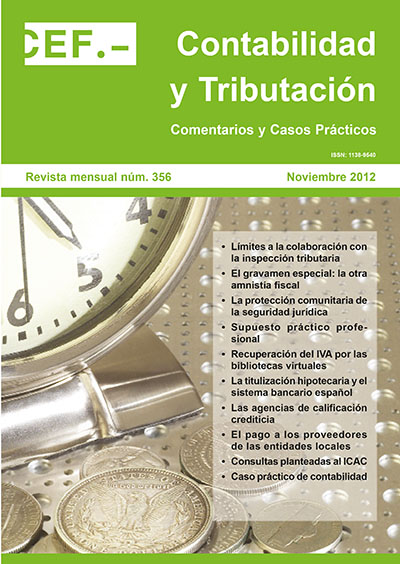La seguridad Jurídica como límite comunitario a la articulación de cláusulas de prevención y lucha contra el fraude y la evasión fiscal: una nota sobre la STJUE de 5 de julio de 2012, Asunto SIAT, C-318/10
DOI:
https://doi.org/10.51302/rcyt.2012.6667Palabras clave:
límites comunitarios a la configuración de cláusulas de prevención y lucha contra el fraude y la evasión fiscal, presunciones de fraude y evasión fiscal y Derecho Comunitario, principio comunitario de seguridad jurídica y sus implicaciones, libre prestación de servicios, medidas fiscales restrictivas y su justificaciónResumen
El presente trabajo tiene por objeto el estudio de las implicaciones derivadas de la reciente Sentencia del Tribunal de Justicia de la Unión Europea (TJUE) de 5 de julio de 2012 (asunto SIAT, C-318/10), que aborda la compatibilidad con la libre prestación de servicios de una medida nacional que establece una presunción de prevención y lucha contra el fraude y la evasión fiscal excluyendo la deducibilidad fiscal de determinados gastos cuando tienen lugar en el marco de operaciones transfronterizas con sujetos que disfrutan de un régimen fiscal privilegiado.
El aspecto más reseñable de esta sentencia reside en la aportación que hace el TJUE introduciendo un nuevo límite comunitario a la configuración de las cláusulas de prevención y lucha contra el fraude y la evasión fiscal nacionales que generan restricciones excesivas al ejercicio de las libertades comunitarias. El Tribunal de Justicia termina considerando que la cláusula antiabuso belga resulta contraria al Derecho Comunitario por contravenir el principio de seguridad jurídica, en la medida en que está configurada de tal forma que «no permite determinar con carácter previo y con la precisión suficiente su ámbito de aplicación».
A nuestro juicio, podríamos estar ante un importante pronunciamiento seminal del TJUE, en cuanto aporta una formulación comunitaria del principio de seguridad jurídica en materia tributaria, con todo lo que ello conlleva de cara a la configuración de determinado tipo de cláusulas nacionales de prevención y lucha contra el fraude y la evasión fiscal.















